Can Lodge Pots Go in the Dishwasher?: Ultimate Care Tips
We may earn affiliate fees for purchases using our links (at no additional cost to you).
Lodge pots are generally not dishwasher safe, as the high heat can damage the seasoning. In particular, enameled Lodge cookware may be an exception, where it is considered dishwasher safe.
When it comes to maintaining your Lodge cookware, understanding the proper cleaning techniques is crucial for preserving its quality and extending its life.
As synonymous with durability and timeless cooking,
Lodge pots are often a staple in kitchens. However, the convenience of dishwasher use is not typically afforded to these robust kitchen companions.
Ensuring the longevity of your Lodge pots means embracing a hands-on approach to cleaning.
Seasoned cast iron requires a bit of extra care, setting it apart from the set-it-and-forget-it dishwasher crowd.
By keeping these considerations in mind, you can delight in the myriad of culinary adventures your lodge cookware offers without falling prey to maintenance mishaps.

Understanding Lodge Pots
Lodge pots are widely appreciated for their durability and ability to retain heat, making them an ideal choice for a variety of cooking methods.
These cast iron pots can go from stovetop to oven effortlessly, and they’re perfect for searing, sautéing, baking, broiling, braising, and frying.
The material of Lodge pots is a premium cast iron that stands the test of time.
It’s known for its high-quality construction and ability to maintain consistent cooking temperatures.
This material can also improve with use, as it develops a non-stick surface through the seasoning process.
Seasoning Lodge pots is a method through which a layer of oil is baked onto the iron for a natural, easy-release finish that improves with use.
Seasoning forms a patina that acts as a protective layer, making the pot more resistant to rust and creating an excellent non-stick surface.
This process is essential for maintaining and enhancing both the performance and longevity of the cookware.
Care Tips For Lodge Pots
Proper care for Lodge pots is essential to ensure their longevity and maintain their quality.
Despite the convenience of dishwashers, it is generally recommended to handwash Lodge pots with warm soapy water and a sponge or stiff brush.
This method helps to protect the cookware’s seasoning and prevent rust. Rinse them thoroughly and dry them immediately after washing to prevent water spots and rusting.
Regarding dishwasher usage for Lodge pots, it is crucial to note that the high heat and harsh detergents can harm the pots’ seasoning.
Lodge pot owners should check the manufacturer’s guidelines, as some newer lines of enameled Lodge cookware are marketed as dishwasher-safe.
Maintenance and storage of Lodge pots are fairly straightforward. After cleaning, apply a thin layer of vegetable oil to the surface before storing.
Ensure the storage area is dry to prevent rust and damage. If stacking pots, it is advisable to place a layer of paper towels or a pot protector between them to prevent scratches.
Frequently Asked Questions For Can Lodge Pots Go In The Dishwasher
Are Lodge Pots Dishwasher Safe?
How To Clean Lodge Cast Iron Pots?
What Damages Lodge Pots In Dishwashers?
Can Enameled Lodge Cookware Be Dishwashed?
Conclusion
Caring for your Lodge pots just got easier! Dishwashers are indeed safe for these durable kitchen staples.
Keep in mind the seasoning recommendations to maintain their top-notch quality.
Embrace the blend of traditional cookware and modern convenience, ensuring your Lodge pots continue to serve up delicious meals for years to come.